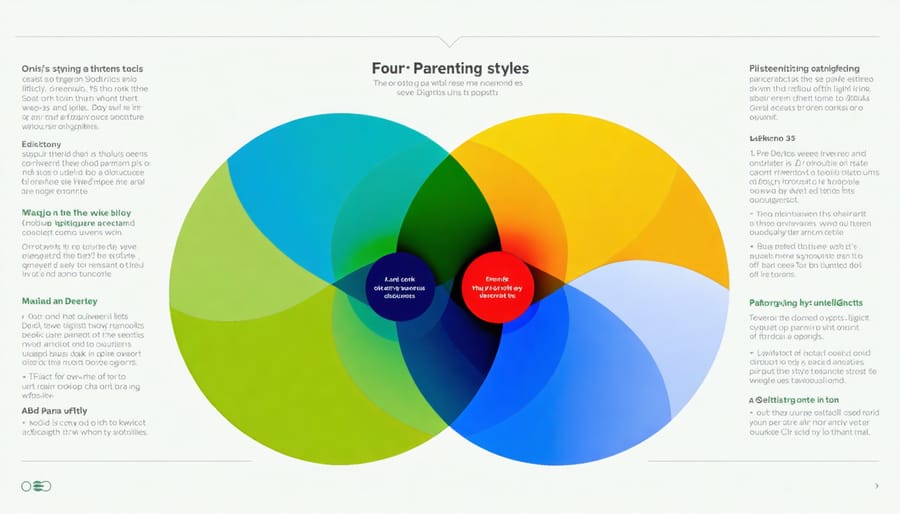Discover the four foundational parenting styles – authoritarian, authoritative, permissive, and uninvolved – and uncover how each uniquely shapes your child’s psychological, behavioral, and academic growth. Authoritarian parents prioritize strict rules and unquestioning obedience, often leading to children who are obedient but may struggle with self-esteem and decision-making. In contrast, authoritative parenting balances clear expectations with warmth and responsiveness, fostering happy, capable, and successful children. Permissive parents set few limits, resulting in children who may be creative and confident but lack self-control and struggle academically. Finally, uninvolved parents are emotionally distant and unresponsive, increasing the risk of poor self-esteem, behavioral problems, and academic difficulties in their children. By understanding these styles and their effects, you can consciously adapt your approach to support your child’s healthy development and lifelong well-being.

The 4 Parenting Styles

Authoritarian Parenting
Authoritarian parenting is characterized by strict rules, high expectations, and little warmth or responsiveness. Parents who use this style prioritize obedience and often rely on punishment to enforce compliance. For example, imagine a child who comes home excited to share a new interest, only to be met with criticism for not completing their chores first. The parent may say, “I don’t care about your hobbies. You need to focus on your responsibilities.” This lack of emotional support can lead to low self-esteem, poor communication skills, and difficulty forming close relationships. While children of authoritarian parents may perform well academically and behaviorally in the short term, they may struggle with mental health issues, such as anxiety and depression, and have a higher risk of substance abuse later in life.
Permissive Parenting
Permissive parenting is characterized by few rules, low expectations, and high responsiveness to a child’s needs and desires. Parents with this style prioritize their child’s freedom and autonomy over setting firm boundaries. For example, a permissive parent may allow their child to decide their own bedtime, even if it’s late, to avoid conflict and maintain a friendly relationship. While permissive parenting fosters creativity and independence, it can also lead to a lack of self-discipline, as children may struggle to learn self-control and respect for authority. This parenting style may result in children who are impulsive, demanding, and have difficulty following rules or managing frustration. However, permissive parents are often warm, nurturing, and highly attuned to their child’s emotional needs.
Uninvolved Parenting
Uninvolved parenting, also known as neglectful parenting, is characterized by a lack of emotional involvement and support. Parents who adopt this style often fail to meet their child’s basic needs, both physical and emotional. They may provide little guidance, attention, or nurturing, leaving the child to fend for themselves. Communication is minimal, and the parent is generally unresponsive to the child’s needs or desires. For example, an uninvolved parent might rarely ask about their child’s day, show little interest in their hobbies or friendships, and provide minimal structure or discipline. This hands-off approach can stem from a variety of factors, such as parental stress, substance abuse, or a lack of understanding of child development. The effects of uninvolved parenting can be detrimental, often leading to poor self-esteem, behavioral problems, and difficulty forming healthy relationships later in life.
Authoritative Parenting
Authoritative parenting balances high expectations with emotional warmth and open communication. Parents set clear, reasonable rules and consistently enforce them, but also listen to their children’s perspectives. They use positive reinforcement to encourage good behavior and calmly explain consequences for misbehavior. For example, an authoritative parent might say, “I understand you’re upset about turning off the TV, but our family rule is no screens after 8pm. Let’s talk about why this boundary is important for your health.” This approach fosters self-discipline, confidence, and strong parent-child relationships. Children of authoritative parents tend to be independent, socially competent, and academically successful. While maintaining structure, authoritative parenting emphasizes empathy, open dialog, and meeting children’s emotional needs, creating an environment where kids feel secure, supported, and valued.

Effects on Child Development
Psychological Well-being
Parenting styles play a crucial role in shaping a child’s psychological well-being. According to a study by Baumrind (1991), children raised by authoritative parents tend to have higher self-esteem, better emotional resilience, and more positive coping strategies compared to those raised by other parenting styles. Authoritative parenting provides a supportive environment that fosters emotional growth and security. In contrast, children of authoritarian parents may struggle with self-confidence and emotional regulation due to the strict and controlling nature of this style. Permissive parenting can lead to poor impulse control and difficulty handling frustration, as children lack consistent boundaries and guidance. Uninvolved parenting, characterized by emotional detachment and neglect, can have the most detrimental effects on a child’s mental health, increasing the risk of depression, anxiety, and attachment disorders (Darling, 1999). By understanding the impact of parenting styles on psychological well-being, caregivers can make informed decisions to support their child’s emotional development and overall mental health.
Behavior and Social Skills
Parenting styles significantly influence a child’s behavior and social skills. Authoritative parenting, characterized by warmth, responsiveness, and clear expectations, is associated with positive behavioral outcomes. Children raised by authoritative parents tend to exhibit better self-control, cooperation, and social competence. They are more likely to form healthy friendships and resist negative peer pressure. In contrast, children of authoritarian parents, who are strict and unresponsive, may struggle with social interactions due to limited opportunities to practice social skills. Permissive parenting, which is warm but lacks boundaries, can lead to impulsivity and difficulty following rules in social settings. Neglectful parenting, characterized by emotional detachment and lack of involvement, often results in children with poor social skills and behavioral problems. For example, a child raised by authoritative parents may confidently invite a new classmate to play, while a child from an authoritarian household may hesitate to approach others. By providing a supportive yet structured environment, parents can foster the development of strong social skills and positive behaviors in their children.
Academic Performance
Parenting style has a significant impact on a child’s academic performance. Authoritative parenting, characterized by high expectations, emotional support, and open communication, is consistently linked to better educational outcomes. Children raised by authoritative parents tend to have higher grades, stronger motivation, and greater academic success. Conversely, neglectful parenting, with its lack of involvement and guidance, often leads to poor school performance and a higher risk of dropping out.
Permissive parenting, while nurturing, can result in less self-discipline and lower academic achievement due to a lack of structure and expectations. Authoritarian parenting’s strict rules and high demands may yield short-term compliance but can undermine intrinsic motivation and lead to rebellion. Educational research emphasizes the importance of striking a balance between warmth and firmness, as seen in the authoritative style, to foster a love of learning, self-regulation, and academic resilience. By tailoring their approach to their child’s unique needs and maintaining an encouraging, supportive home environment, parents can set the stage for long-term educational success.
Long-term Outcomes
The long-term effects of parenting styles can shape a child’s life well into adulthood. Adults raised by authoritative parents tend to have higher self-esteem, better social skills, and more successful careers. They are more likely to form healthy, stable relationships. In contrast, those raised by authoritarian or permissive parents may struggle with self-regulation, decision-making, and maintaining close bonds. Neglectful parenting can lead to attachment issues, low self-worth, and difficulty trusting others, impacting future relationships and job stability.
A 2019 study found that adults who experienced authoritative parenting reported greater life satisfaction and emotional well-being compared to those raised with other styles. Another study revealed that individuals with authoritarian parents were more likely to develop anxiety, while those with permissive parents had higher rates of substance abuse.
As a parent, your actions today can profoundly impact your child’s future happiness and success. By striving for an authoritative approach, balancing warmth and structure, you give your child the tools they need to thrive as adults.
Conclusion
In conclusion, understanding the four main parenting styles and their effects is essential for fostering healthy child development. Authoritative parenting, characterized by high expectations and responsiveness, tends to yield the most positive outcomes. Children of authoritative parents often exhibit better psychological adjustment, social competence, and academic performance compared to those raised under other styles.
While authoritarian, permissive, and uninvolved parenting can have negative consequences, it’s important to remember that no parent is perfect. The key is to strive for a balance of structure and warmth, adapting your approach to your child’s unique needs. By setting clear boundaries, maintaining open communication, and providing emotional support, you can create a nurturing environment that promotes your child’s overall well-being.
As a parent, it’s crucial to reflect on your own upbringing and how it influences your parenting style. Recognize the areas where you excel and identify opportunities for growth. Small changes, such as actively listening to your child or enforcing consistent rules with empathy, can make a significant difference in your family dynamics and your child’s development.
Remember, parenting is a journey of continuous learning and improvement. By staying informed, seeking support when needed, and prioritizing your child’s well-being, you can become the best parent possible. Trust in your ability to adapt, grow, and provide the love and guidance your child needs to thrive. With dedication and self-awareness, you can create a strong foundation for your child’s future success and happiness.







